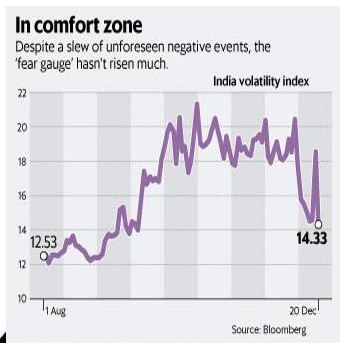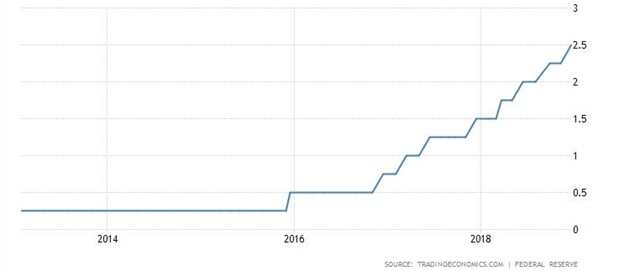The American and European stock markets tumbled after Jerome Powell led the Federal Open Market Committee (FOMC) decided to raise interest rates for the fourth time this year. The Asian markets were also severely affected by the hawkish stance of central bank of United States. The Fed raised the interest rate by 25 basis points from 2.25 to 2.5 percent in yesterday’s meeting. The investors across the world reacted strongly on the Fed rate hike but Indian market was unexpectedly calm. The Indian market has been relatively resilient in the last few months and the fear gauge has not raised much. This is suggestive of strong investor sentiment on Indian economy.

The unexpected bonanza of softening crude oil prices has proved extremely helpful in supporting the Indian economy. The cheer on Dalal Street was also supported by the government’s effort to boost liquidity through various measures. The IL&FS crisis posed a liquidity crisis for the economy but the proactive gesture of the government and supportive stance of RBI in the last few months helped the country to overcome the crisis. “As liquidity is returning to the system and oil prices are softening, bond yields have fallen sharply. So, public banks would be key beneficiaries of this since they hold bulk of government securities,” said Pramod Gupta, partner, Ajarva Partners.

US Fed meets once in six weeks and most probably 8 times a year. At the start of this calendar year, lending rates in the US were 1.5 percent and by the end of the calendar year, it seems to have reached to 2.5 percent with four hikes of 25 basis points. China’s Shanghai Composite Index, Hong Kong’s Hang Seng index, South Korea’s Kospi shed 1% or more on yesterday’s Fed hike. But the Indian market has been quite resilient towards the fed rate hike. In fact, the NSE’s India Volatility Index (VIX) declined by 23 percent to reach 14.33. “The Indian stock market has been resilient to negative news, which is surprising. Earlier, there used to be a high correlation between the movement in the US markets and Indian stocks, but that doesn’t seem to be the case anymore,” said Gupta.
The market has been resilient towards global as well as domestic events. Also, the RBI government tussle which unfolded after Viral Acharya’s controversial speech does not seem to have any negative impact on stock markets. Generally, there is a negative correlation between BJP’s loss in elections and the stock market’s performance but this time it was not the same. In fact, the market showed a positive gain despite the fact that the ruling party at the centre lost in elections in three states. This depicts that the sentiment of investors is highly positive towards the Indian market. The easing of liquidity crisis and softening of crude prices can be cited as the two major reasons behind this. The crude oil prices hit the lowest this year to 56 dollars per barrel and Indian market responded positively. The Indian Economy appears resilient enough to shed the effect of any other international events like that of a Fed hike.

























